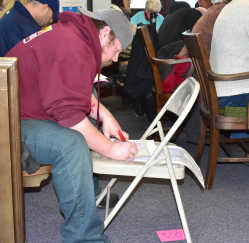Delinquent tax buyers in it for the money, not the property

McCOOK, Neb. — Most often, the person who "buys taxes" at a sale of delinquent real estate taxes is hoping to make money by adding interest and fees to the taxes when the property owner redeems the "tax certificate" that the buyer holds on the property.
He's in it for the money.
As far as a county is concerned, after a sale of taxes, the late taxes are now "paid in full" and they can be distributed to the county and its taxing entities such as cities and schools.
Twenty buyers/investors participated in Red Willow County's public sale of real estate taxes Monday, March 4, raising $298,910.18. Red Willow County treasurer and tax collector Sue Wesch said 190 tax certificates were sold.
At the public sale, Wesch listed 439 parcels whose taxes were available for purchase. The highest delinquent tax available for purchase was $8,609.82; the lowest was $0.24.
The late taxes on 69 properties advertised as having delinquent taxes were paid in full before the sale. This bunch of delinquent taxes included the highest unpaid tax of $11,116,98.
On another seven properties, half of the total late taxes were also paid before the sale.
The list of delinquent taxes does not include interest due or the county's costs to advertise the sale.
The most recent delinquent taxes are from tax year 2017. Some of the 439 parcels have multiple unpaid years of taxes; some have more than one tax certificates.
Wesch never advises or guides buyers, but tells them to consult with an attorney on the process of and legal questions involved in buying taxes.
———
In most cases, the buyer of taxes isn't in the process to obtain property.
The property owner has three years to redeem the tax certificate given to the buyer/investor at the close of the sale. If, after three years, the property owner hasn't paid the investor to redeem the tax certificate (plus interest, attorney's fees, court filing fees, allowed by state statute), the investor has six months to start foreclosure proceedings to acquire clear title to the property.
If the investor, for whatever reason, does not start foreclosure proceedings within the required six months, the county dismisses the tax certificate and, essentially, the investor has paid the property owner's taxes for the year of the tax certificate.
———
Red Willow County's annual tax sale is always the first Monday of March.
Taxes not sold at the public sale or in a "private" sale in the treasurer's office following the public sale and having two years of delinquent taxes are put on a "county tax certificate," and the county attorney's office eventually forecloses on the properties for the county.
At the sale March 4, buyers/investors had a variety of late taxes from which to choose: Taxes on rural acreages of all sizes; taxes on properties in McCook, Indianola, Bartley, Marion, Danbury and Lebanon; taxes on improvements (hog barns, storage warehouses, grain bins) on leased agricultural or commercial land; and unpaid occupation taxes on irrigated land.
